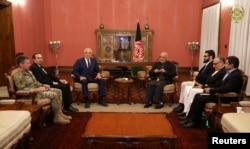The government in Afghanistan is playing down the significance of reported U.S. troop reduction plans, saying Afghan security forces are capable of protecting and defending the country on their own.
Officials in Washington are reported as saying President Donald Trump is considering withdrawing roughly half of the more than 14,000 U.S. troops stationed in Afghanistan.
The U.S. forces are part of a non-combat NATO military mission of about 20,000 troops whose primary mission is training and advising Afghan forces in their battles against Taliban insurgents and terrorists linked to Islamic State.
"If the few thousand foreign troops that advise, train and assist, leave it will not affect our security," said Fazel Fazly, the chief Afghan presidential advisor in Kabul. He dismissed suggestions the Afghan National Defense Security Forces (ANDSF) would collapse with the departure of U.S.-led International forces.
Under the reported plan, about 7,000 American troops would start going home in January, and the rest would exit in the coming months in a phased drawdown. There was no comment from the Pentagon or U.S. Central Command on the reports.
"During the past four and half years, the fight on the frontline and security of the entire nation was carried out by the same forces, and despite the overwhelming war, our national armed and air forces have strengthened day by day and they will grow in strength even more," Fazly vowed.
But U.S. military commanders have been skeptical about whether ANDSF would be able to sustain battlefield pressure from the Taliban without support from foreign partners.
"They are not there yet and if we left precipitously right now I don't believe they would be able to successfully defend their country," Lt. Gen. Frank McKenzie, nominated to head U.S. Central Command, told a Congressional hearing earlier this month when asked whether Afghan forces would be able to defend the country without foreign military support.
Afghan President Ashraf Ghani said last month that nearly 30,000 ANDSF forces had been killed in the fighting since 2015. The insurgents, currently controlling or hotly contesting about half of Afghanistan, continue to inflict heavy casualties on government forces and make territorial gains.
The Trump administration has recently stepped up efforts to find a negotiated settlement to the war with the Taliban and has engaged the insurgents in direct peace talks.
U.S. special representative for Afghanistan reconciliation, Zalmay Khalilzad, this week concluded another round of talks with Taliban negotiators in the United Arab Emirates. Both sides described the dialogue as productive and promised to meet again in the Gulf country.
The main Taliban spokesman told VOA Friday that during the two-day talks in Abu Dhabi, which stared on Monday, insurgent officials sought nothing but "a date or timeline" for all U.S.-led forces to pull out from Afghanistan. Zabihullah Mujahid said that for his part, Khalilzad sought assurances that terrorists would not be allowed to use Afghan soil to threaten the security of the United Sates.
Ambassador Khalilzad also shared on Thursday details of his interaction with the Taliban.
"Our goal is not to have permanent military bases in Afghanistan. The goal is that if Afghanistan becomes peaceful and terrorism from Afghanistan is not a danger to the world, the United States will withdraw and will have a new relationship with the government of Afghanistan based on a bilateral agreement," Khalilzad told Afghan television channels when asked whether the U.S. would agree to troop withdrawal demand by the Taliban.
Reports about Trump's Afghan drawdown plan emerged a day after his stunning announcement that the U.S. would pull its troops out of Syria.
Republican Senator Lindsey Graham, who recently returned from Kabul, warned in a series of tweets Islamic State's Afghan affiliate, or ISIS-K remains a direct threat to the U.S. and the terrorist group would "dramatically" benefit from a reduced American troop presence.
The key Trump ally was referring to the September 2001 attacks on American cities that promoted the U.S.-led invasion of the country. Like in Syria, the Afghan troop withdrawal should be based on conditions on the ground, the Senator emphasized.
"The conditions in Afghanistan at the present moment make American troop withdrawals a high risk strategy. If we continue on our present course we are setting in motion the loss of all our gains and paving the way toward a second 9/11," said Graham.
Analysts say the reported plan would undermine renewed U.S. efforts to persuade the Taliban to engage in an intra-Afghan dialogue to end decades of hostilities in the country.
Michael Kugelman, deputy director Asia program and South Asia senior associate at Washington's Wilson Center describe the timing of the U.S. drawdown plan as "breathtakingly bad", fearing the move could squander the latest effort to seek a negotiated settlement to the prolonged Afghan war.
"Let's be clear: Trump's decision, if confirmed, amounts to a propaganda coup and a tactical triumph for the Taliban. It's gotten the troop withdrawals it's always wanted. And it now has an added battlefield advantage. Doubtful the Taliban will reciprocate with its own concession," Kugelman tweeted.






